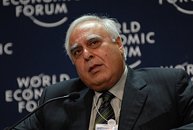Cornered Indian Ruling Party Proposes Internet and Social Media Censorship à-la China
India's United Progressive Alliance government is mulling censorship of the internet à-la China, to filter out any content that speaks against members of the ruling party. India's multi-partisan democracy is increasingly making use of the web as a medium of political discourse and exchange, something that only works to make voters more informed. Union minister of IT and Telecommunications Kapil Sibal kicked off a storm this week when he announced that he is in talks with representatives of search engines and social networking websites, Google, Facebook, Twitter, Yahoo, and Microsoft to work out a censorship model that filters content that "unfairly maligns" the government. Apart from anti-government content, the government is concerned about hateful or "blasphemous" content, which could disturb communal harmony. "Some of the content which is being carried is blasphemous. This can hurt religious sentiments and it has to be removed," Sibal said.
Google, fresh out of a censorship and GMail espionage tussle with China, stated that it will not remove any content from its search results that are legal, merely on grounds of being "controversial". "We work really hard to both follow the law and also give people as much access to information as we can. So we follow the law when it comes to illegal content. And even where content is legal but breaks our own terms and conditions we take that down too, once we've been notified about it," said Google in a statement. "When content is legal but controversial we don't remove it because people's differing views should be respected, so long as they are legal."
Google, fresh out of a censorship and GMail espionage tussle with China, stated that it will not remove any content from its search results that are legal, merely on grounds of being "controversial". "We work really hard to both follow the law and also give people as much access to information as we can. So we follow the law when it comes to illegal content. And even where content is legal but breaks our own terms and conditions we take that down too, once we've been notified about it," said Google in a statement. "When content is legal but controversial we don't remove it because people's differing views should be respected, so long as they are legal."

